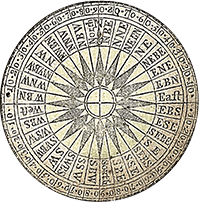Recently I’ve shared information concerning the Shawnee religion (from a white man’s perspective), the Shawnee alphabet, marriage customs of some Algonquin tribes and Shawnee parenting. I would like to share some information I found concerning Shawnee faith and law, penned by Thomas Wildcat Alford, (Tecumseh’s great-grandson) who left us the following information:

The Great Spirit, or ruler of destinies, was believed to be a grandmother, who was constantly weaving an immense net, which was called a Skemotah, and it was our belief that when the great net was finished, it would be lowered to the earth, and all who had proven themselves by their actions to be worthy of the better world –the happy hunting ground – would be gathered into its folds –and the world would then come to an end. Some horrible fate awaited those where left.
We were always taught that good conduct would earn a reward, and that evil conduct would bring sorrow. We had our own religious beliefs and convictions. Our standards were just as rigid as the laws of any other people, but force was seldom used to obtain good conduct. One point that I want to emphasize, and make strong and clear, is that among primitive Shawnee Indians, morality was a fixed law, but each person was his own judge. From early childhood this principle was instilled into our minds, and deceitfulness was a crime of itself. We lived according to our own standards and principles, not for what others might think of us.
Absolute honesty toward each other was the basis of character. Apparently, without that which the white race considers “Goodbreeding” the were standards and rules that were followed scrupulously. Utterly without those commonly known to society, we or I should say they, observed certain forms that were inflexible, and ignorant of our people, chief of among them being consideration of the rights of others. They had never heard of the “Golden Rule”, but it might be considered the foundation of all their intercourse. They expressed it in the following form:
*Do not kill or injure your neighbor, injure yourself, for it is not him that you injure, you injure yourself. But do good to him, therefore add to his days of happiness as you add to your own.
*Do not wrong or hate your neighbor, for it is not him that you wrong, you wrong yourself. But love him, for Moneto loves him also loves as he loves you.
In this form-giving a reason why one should not do this wrong or that wrong- is a sort of boomerang on the evil-doer. If this spirit was lacking in their intercourse with other races, who can say that it was not justified? If cunning and deception were resorted to in the dealings with the white people it was pitted against a wisdom that the red man felt powerless to cope with on a common ground.
The Shawnee had no officers, no jails; but misdeeds did not go unpunished. Punishments were of many kinds, and were determined by the gravity of the offence. Our chief’s word was law and any persistent refusal to obey the unwritten code of honorable conduct was punishable by severe flogging or even death. Any one refusing to take his punishment like a man was ostracized from his tribes to which death was preferable. Nor were the women of our tribe free from the law. The most heinous crime of which a woman could be convicted was that which we called pockcano-madee-way-gossip about people. Some of our beliefs were based on superstition; it must be acknowledged that they are not unlike the teachings of Christianity. The main point of difference is that our people believed they only were responsible for their conduct towards their own race. To others they owed nothing, except to return in kind the treatment they received.”
Welcome to “Sharing the Stories of History with Tim Mann”!
Meet Timothy A. Mann, a passionate historian born and raised in the heart of Shelby County, Ohio where Tim’s roots run deep in the rich soil of American history. As the author of articles and books, including “Frontier Miscellany Concerning the Miami County Ohio Militia,” “Colonel John Mann, His Kith and Kin,” and “Frontier Militia – The War of 1812,” Tim’s literary contributions have enlightened and inspired countless history enthusiasts.



